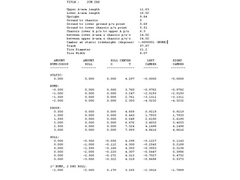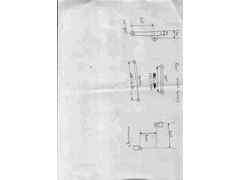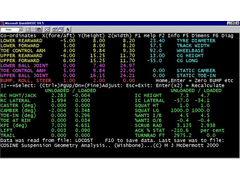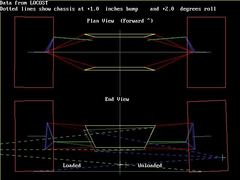dblissett
|
| posted on 21/4/04 at 09:00 PM |

|
|
suspension book
i am having a nightmare trying to sort out my irs for my 442 i have used the avon dimentions and as the rear suspension rises the top of the wheels
move outwards i think this is possative camber and it should be the oposite
before i loose my temper and scrap the lot can anyone recomend a good book on suspension design or should i give up on irs and get a dedion tube from
gts
does this tube fit a +4 chassis
cheers a very pissed off dave
|
|
|
|
|
wicket
|
| posted on 21/4/04 at 09:06 PM |

|
|
How to build & modify Sportscar & Kit car Suspension & Brakes; Des Hammill
Simple easy to understand diagrams & description, needs to be read a few times I think to fully understand though.
|
|
|
Mark Allanson
|
| posted on 21/4/04 at 09:08 PM |

|
|
I have it as well, bloody good book, cheap on Amazon
If you can keep you head, whilst all others around you are losing theirs, you are not fully aware of the situation
|
|
|
dblissett
|
| posted on 21/4/04 at 09:10 PM |

|
|
as you have both got the book which way did you decide to go with your back suspension irs live axel or dedion
cheers dave
|
|
|
wicket
|
| posted on 21/4/04 at 09:12 PM |

|
|
Live axle, Cortina, in a Luego locost chassis.
|
|
|
Mark Allanson
|
| posted on 21/4/04 at 09:15 PM |

|
|
Live axle, capri in a book chassis
I will start modifying after the SVA, particularly trailing arm lengths and angles
If you can keep you head, whilst all others around you are losing theirs, you are not fully aware of the situation
|
|
|
pbura
|
| posted on 21/4/04 at 10:29 PM |

|
|
Do you have any way to move your upper chassis pivots down? If you can, that would be the way to get a more satisfactory camber curve.
Here's a free suspension program that will allow you to see what it takes to get camber behavior similar to your front. If you can achieve
that, and a roll center that's (1) slightly higher than the front RC, and (2) stays fixed laterally in roll, you're home free.
Suspen
You might also need either longer upper wishbones (or shorter lowers) if you change these pivot locations.
Got a picture of your rear chassis?
Pete
Pete
|
|
|
jcduroc
|
| posted on 21/4/04 at 11:20 PM |

|
|
quote:
Originally posted by dblissett
i am having a nightmare trying to sort out my irs for my 442 i have used the avon dimentions and as the rear suspension rises the top of the wheels
move outwards i think this is possative camber and it should be the oposite ...
Dave
I just found out the same when drawing an Avon-dimentions based IRS; have a look at this thread.
http://www.locostbuilders.co.uk/viewthread.php?tid=12252&page=1#pid102651
Use the "suspen" prog that Pete recomends.
I'm designing entirely my rear suspension based on a 1.6 Sierra diff + driveshafts.
How much will your rear track be?
Joćo
JCM
|
|
|
type 907
|
| posted on 21/4/04 at 11:26 PM |

|
|
Hi All,
I'v had a go at making my own IRS.
My top wishbone is about two thirds the length of the bottom wishbone. They start off horizontal, and as they rise the top effectively shortens more
than the bottom one thus creating negative camber on compression.
I haven't driven it yet, but it looks right.
Paul G
Too much is just enough
|
|
|
jcduroc
|
| posted on 21/4/04 at 11:47 PM |

|
|
IRS Rear Suspension
Try these:
Top wishbone
Chassis mounting from CL: 305 mm
-----"---------"------ from ground: 300 mm
Length: 295.5
Bottom wishbone
Chassis mounting from CL: 178 mm
-----"---------"------ from ground: 140 mm
Length: 407
Upright
CL height from ground: 269.3 (tyre rolling radius)
Top mounting from chassis CL: 585 mm
-----"---------"------ from ground: 594.3mm
Bottom mounting from chassis CL: 585mm
-----"---------"------ from ground: 144.3mm
Track is 1470 mm
Starting camber is 0ŗ (later to change to -0.5ŗ/-1ŗ according to tyres)
Roll center height: 108 mm (4 in. 1/4).
Pls, feed back the results and your opinion.
Cheers
Joćo
JCM
|
|
|
britishtrident
|
| posted on 22/4/04 at 06:30 AM |

|
|
I don't know the avon suspension but if the top wishbone is about 2/3 the length of the lower one it is i the right ball park.
The inner pivots for the top and bottom rear wishbones need moved -- most likely the lower one will need to be raised so the lower pivot 0.5"
higher at the inner end than the outer and the upper lowered by perhaps 1".
My fvourite suspension book is "How To make Your Car
Handle" author Fred Phun Publisher HP Books ISBN 0-912656-46-8
[Edited on 22/4/04 by britishtrident]
|
|
|
Bob C
|
| posted on 22/4/04 at 10:03 AM |

|
|
To get camber control right, your swing axle length (where lines through wishbone pivots converge) needs to be on the "car" side of the
wheel - i.e. the vertical separation of the chassis pivots should be less than the vertical separation of the upright pivots.
All the above applies - try to get an old dos program called "suspen.exe" to locate your roll centre properly if you can be bothered. U2U
me if you want it posting to you.
cheers
Bob C
|
|
|
pbura
|
| posted on 22/4/04 at 11:29 AM |

|
|
quote:
Originally posted by jcduroc
Try these:
[snip]
Upright
CL height from ground: 269.3 (tyre rolling radius)
Top mounting from chassis CL: 585 mm
-----"---------"------ from ground: 594.3mm
[snip]
Pls, feed back the results and your opinion.
Was taking a peek, but outboard top pivot height of 594.3mm appears to be incorrect (taller than the wheel). What's the right measurement?
Your chassis appears to be quite low! Is it for racing?
Pete
Pete
|
|
|
jcduroc
|
 posted on 22/4/04 at 01:28 PM posted on 22/4/04 at 01:28 PM |

|
|
quote:
Originally posted by pbura
quote:
Originally posted by jcduroc
Try these:
[snip]
Upright
CL height from ground: 269.3 (tyre rolling radius)
Top mounting from chassis CL: 585 mm
-----"---------"------ from ground: 594.3mm
[snip]
Was taking a peek, but outboard top pivot height of 594.3mm appears to be incorrect (taller than the wheel). What's the right measurement?
Your chassis appears to be quite low! Is it for racing?
Pete
Sorry all.
It's 394.3 not 594.3 (typing error).
No Pete it's for fun driving
Ground clearance is to be 115 mm at the front axle plane and 120 mm at the rear (very slight raking)
JCM
|
|
|
pbura
|
| posted on 22/4/04 at 02:45 PM |

|
|
For everybody's info, below is the kind of data you get from Suspen.exe; I added some sub-captions to explain the movements.
Joćo,
Here's your data in Suspen. Sorry about the units of measure, but it was the only way. Camber change looks excessive, but if you raise the
upper inboard pivot along the same tube (if possible), you will fix this, and retain the very fine RC behavior, as you've found the Magic Angle

Please feel free to U2U or e-mail if you'd like to talk about alternatives.
ATB,
Pete
 
Rescued attachment JCMIRS.jpg
Pete
|
|
|
jcduroc
|
| posted on 22/4/04 at 03:23 PM |

|
|
Pete
I just converted the inches to mm.
Before going into a deep analysis of the figures pls tell me:
* between lower A-arm & chassis p/u's (pivot mountings?) 14.02 (356.11 mm); where does it come from?
* between upper A-arm & chassis p/u's (pivot mountings?) 24.02 (610.11 mm); where does it come from?
Cheers
Joćo
JCM
|
|
|
pbura
|
| posted on 22/4/04 at 04:19 PM |

|
|
quote:
Originally posted by jcduroc
Pete
I just converted the inches to mm.
Before going into a deep analysis of the figures pls tell me:
* between lower A-arm & chassis p/u's (pivot mountings?) 14.02 (356.11 mm); where does it come from?
* between upper A-arm & chassis p/u's (pivot mountings?) 24.02 (610.11 mm); where does it come from?
Cheers
Joćo
Those are the chassis mounting from CL figures, multiplied by 2.
P.
Pete
|
|
|
Digger Barnes
|
| posted on 22/4/04 at 05:35 PM |

|
|
Hi I know I am bit late to this thread, but I am in the stage of designing my IRS at the moment.
I'll give you a bit of background to what I have been doing.
I felt that I needed to understand a bit more about suspension geometry and the like (I want to race the car and want it handle as well as is possible
having no previous experience apart from F#~+][g it up when I was a kid by lowering cars and changing wheels without thinking about the handling
implications). Anyway I digress so I have tried to read as much as I can about it and then write my own software to give me an idea about what is
going on.
So if you are interested I am just finishing (by the end of the weekend) the first verified (by me) draft. It is a windows program that I have
developed that I hope is easy to use. The dimensions it requires to simulate camber changes are the upright dimensions, wheel tyre dimensions, track
and the points in space of wishbone pickups.
The output gives you
Camber change in:
Bump or droop
Roll (roll center is calculated iteratively across the roll not just taken as the initial roll center of the car)
Bump and droop at the point of roll
Bump and droop during roll.
The output is currently to a csv file that can be read in note pad or excel (animations soon).
If you would like a copy u2u me and I will send one out.
|
|
|
Bob C
|
| posted on 23/4/04 at 06:11 PM |

|
|
Chaps, I just looked back over this thread & realise my comments about suspen.exe could be construed as my thinking it was not much good.
That's not what I meant - it just came out wrong - the program itself is simple to use and enables you to nail your roll centres exactly where
you want 'em. And as Pbura said in an email to me, it's got to be a major factor in having a car feel nice to drive - what else is there?
(rhetorical question......). Previously I was just going to use the simple rules outlined by others - I'm glad I took the trouble (with a lot of
help from Pete) to do it properly. My initial rear suspension roll centre moved 3" sideways with 3 degrees of roll! Now it stays put. Cheers
Pete!
Bob C
|
|
|
dblissett
|
| posted on 23/4/04 at 08:45 PM |

|
|
sketch
here is a very rough sketch of my rear whisbones and moutings it looks like my top wish bones are to short being only 230mm long or should i add 35mm
to get their true length
thanks for everybodys help as i am calming down i wont be scraping the locost just yet
cheers dave
 
Rescued attachment whisbonesrear.jpg
|
|
|
Digger Barnes
|
| posted on 24/4/04 at 10:36 AM |

|
|
Bob it is also my understanding that it is important to try and fix the roll center.
But I do believe (pure speculation as I have not done the calcs to see if it is achievable yet) that it would be advantageous to move the roll center
to the outer wheel in a corner in terms of handling, but I don't know how this would make the car feel.
So a few questions for the experts out there
So does anyone have experience of this to share?
Is it really possible to fix the roll center when different bumps and droops are added into the equation for different wheels?
p.s. my program also outputs the roll center position during roll.
|
|
|
jcduroc
|
| posted on 24/4/04 at 01:31 PM |

|
|
quote:
Originally posted by Digger Barnes
Bob it is also my understanding that it is important to try and fix the roll center.
But I do believe (pure speculation as I have not done the calcs to see if it is achievable yet) that it would be advantageous to move the roll center
to the outer wheel in a corner in terms of handling, but I don't know how this would make the car feel.
So a few questions for the experts out there
So does anyone have experience of this to share?
Is it really possible to fix the roll center when different bumps and droops are added into the equation for different wheels?
p.s. my program also outputs the roll center position during roll.
I suppose that by "fixing the RC" you mean laterally.
In roll the outside wheel goes into bump the inside one in droop so the IC's will move (normally) in opposite directions.
RC will move both vertically (RC height)and horizontally (RC offset). It's almost impossible to keep 0 offset but it may br limited within
reasonable figures (<= 5 mm).
Joćo
JCM
|
|
|
pbura
|
| posted on 24/4/04 at 02:28 PM |

|
|
Bob C, thanks for the good report! I think that whenever anyone gets way off the book (and IRS certainly qualifies), they'd do well to
understand their suspension geometry. Like you guys, I've been reading up because I don't want to screw the pooch.  
Another free suspension design tool that I like is the Wishbone program from Race Tech magazine, available on their downloads page. You need to
register to get it, and you'll also need Microsoft QuickBasic to run it:
https://www.racetechmag.com
What I like about Wishbone is that you can set the chassis in a particular attitude, like 2" bump or 2 degrees roll or some combination, then
twiddle suspension pivots until you get results that look good to you. You can then alter the chassis position and tweak some more. I flip back and
forth between 2" bump and 2 degrees roll to try to strike an effective compromise. I'll also test at 1" bump, 2 degrees roll (favored
by Staniforth for his string computer) because it's a very representative condition in cornering.
After doing the design in Wishbone, you can enter the settings into Suspen and move the suspension through its paces, to get a better sense of
what's happening in a dynamic sense. Suspen can do the whole job, but IMO it's a bit awkward for watching your camber change while
you're tweaking a pivot height, for example.
The only thing I DON'T like about Wishbone is that you're forced to deal with bump steer, which is a PITA during this design stage, though
it's a nice tool to have eventually.
I'm looking forward to checking out Digger Barnes' proggie, too.
Another thing I've done in the way of suspension design is to solve it graphically. The method I used was based on the classical "three
position analysis" method for solving four-bar mechanical linkages. I have a
page on my website about this. Sorry it's a bit hard to follow,
but the CAD program I used was not amenable to creating images for the web, or editing text. What I like about the graphical method is the degree of
control it gives you over the process, more like shooting fish in a barrel rather than jus' fishin' 
Re: Fixed Roll Centers
Two writers I admire, Carroll Smith and Allan Staniforth, go on and on about the desirability of the fixed roll center. It appears to be a handling,
or 'feel' issue, rather than being essential to a car's actual ability to go around corners. The book Locost has a well-fixed front
roll center (and rear, with the solid axle), and I wonder if this isn't a big reason that people find the Locost's handling to be so
incredible, like it's riding on rails. Again, I think the off-book builder would do well to emulate the book geometry as closely as possible,
unless he really knows his stuff about suspension design (I don't). The book Locost RC moves a couple of inches towards the unloaded side in
roll, BTW.
Re: IRS Considerations
I've been fooling around with jcduroc's suspension coordinates, and so far I've learned that if you want a highish RC with IRS, the
layout will more closely resemble that described by type 907 and britishtrident, than what I stated in my first post on this thread. The top bone
will be close to parallel, and the bottom will point upwards somewhat from wheel to chassis. I may be wrong, but with this arrangement it seems
difficult to get really good camber curves in both bump and roll when the RC is much higher than about 3-4". One advantage of a solid axle or de
Dion car is the higher rear RC, which limits weight transfer in roll and maximizes the rear tires ability to provide traction for accelerating, IMO.
The conclusion I'm drawing is that a rear anti-roll bar is practically necessary with IRS.
Sorry about the long post!
Pete
Below is my interpretation of the book Locost front suspension in Wishbone:
 
Rescued attachment Wishbone.jpg
Pete
|
|
|
pbura
|
| posted on 24/4/04 at 02:41 PM |

|
|
Here's the related diagram:
 
Rescued attachment locost2.jpg
Pete
|
|
|
dblissett
|
| posted on 24/4/04 at 07:48 PM |

|
|
irs
i have to hold my hands up and say most of what is being said is way above my knowledge of suspension
with that in mind i think it might be better to admit my limitations and buy a dedion tube from gts
the last thing i want is to spend two years building a car that wont drive properly and i wont be happy with
it seemed like a good idea at the time
thanks every body dave
[Edited on 24/4/04 by dblissett]
|
|
|













